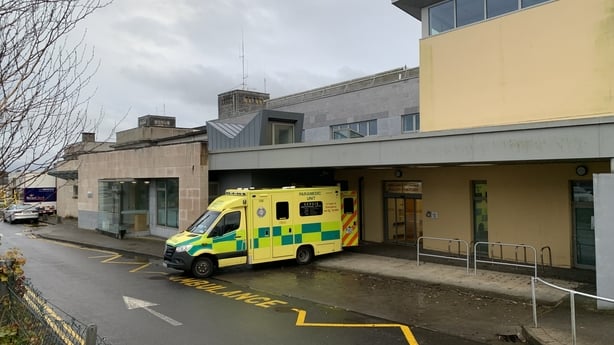The Irish Nurses and Midwives Organisation has said the level of overcrowding across Irish hospitals is "still too high".
The union's latest figures show there are 497 patients waiting for admission to a hospital bed today.
General Secretary Phil Ní Sheaghdha said they have not seen numbers like this at this point in January since the INMO began counting trolleys in 2006.
"Nurses and midwives are working in impossible conditions to provide the safest care they can but it is clear that their workplaces are dangerous," Ms Ní Sheaghdha said.
"Hospitals are not just places of care, they are workplaces. Basic safety is not guaranteed in understaffed and overcrowded wards and emergency departments.
"The Health and Safety Authority and HIQA must intervene through increased planned and unplanned inspections."
Her comments come as Home and Community Care Ireland (HCCI) said the 6,000 long waiting list for home care support, which is a contributor to the hospital and delayed discharge crisis, could be wiped out instantly if home care workers were permitted to take on more hours.
The organisation, which represents private home care providers, is calling on Minister for Social Protection Heather Humphreys to permit a temporary suspension of social welfare earning thresholds to allow home carers to work just three more hours per week without losing social welfare benefits.
CEO Joseph Musgrave said that allowing 6,000 home care workers - half of the 12,000 carers employed in private sector - to take on three additional hours of work a week would provide one million more home care hours this year.
"With a simple stroke of the minister's pen, the waiting list would be wiped out," he said.
"In addition, if the Government were to action this, it would have a meaningful impact on the recruitment crisis in home care and help the Government meet its home care targets this year."
Mr Musgrave said it was "mind boggling" that people are on hospital trolleys waiting for a bed while those who are well enough to be discharged are waiting for home care support.
'Two or three times the demand' for some medicines
Separately, the Director of the Health Products Regulatory Authority has said there is adequate stock of medications in the country and there is "no reason to seek supplies of medicine over and above normal requirements".
Speaking to RTÉ's News at One, Grainne Power said that as a result of the winter surge there is currently "two and three times the demand" for medications.
"Despite this unprecedented demand, there are available stocks of the appropriate prescription and key medicines within the country if you need it for your infection, either the first medicine of choice on the prescription or a suitable alternative," she said.
Ms Power said that while the HPRA does does not control the supply of medications companies notify it when there is going to be a specific shortage or outage of an item.
"We have to publish that information and we do that daily," she said.
Ms Power's comments come as people were urged not to stockpile any medication due to a shortfall in some treatments.
Data published by the HPRA earlier this week showed there were 216 medicines running low or out of stock in Ireland.
They include common over-the-counter remedies such as dry cough syrups and sore throats sprays, as well as lozenges.
The HPRA said the causes of the medicine shortages are multi-factorial, including issues with raw materials and manufacturing difficulties.
Read more: Why do the HSE and INMO trolley figures differ?
Patients to be transferred to Roscommon's Medical Assessment Unit
An initiative aimed at easing pressure on emergency departments in Galway will start next week.
The Medical Assessment Unit at Roscommon Hospital is to be used to treat certain conditions from next Monday, as part of an agreement between the National Ambulance Service (NAS) and the HSE.
The Saolta Hospital Group says it will see a small cohort of "stable medical patients" being transferred directly to the facility, if they meet strict clinical criteria.
From next Monday, NAS paramedics will consult with doctors in Roscommon, to determine if patients are suitable for assessment there. The referral programme will operate between 9 am and 3 pm.

A similar protocol commenced in Ennis this week, in an effort to ease pressure on the Emergency Department at University Hospital Limerick.
Galway / Roscommon TD Denis Naughten has welcomed the development.
He says it will mean more timely care can be provided to those patients who can be safely accommodated at the Unit in Roscommon.
The Independent TD contends that the downgrading of smaller hospitals has added to the pressures being experienced at EDs around the country in recent weeks.
But it is thought the move is unlikely to have a major impact on lengthy wait times elsewhere.
The HSE says that during a three-month trial initiative at Mallow Hospital last year, just 29 patients were transported there by ambulance, instead of being taken to Cork University Hospital.
Additional reporting Fergal Bowers, Pat McGrath

